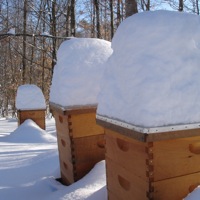There's been so much action I haven't had time to keep up with the blog. I got home in the afternoon on the last day of March to find one of the colonies in my bee yard had just swarmed. They were still in the process of alighting on this branch of our large tulip tree when I saw them, or rather heard them. A swarm at home is very convenient to catch, and I had them in a box a short while later. Unfortunately, their mind was made up. Although they spent several days in the new hive I set up for them, and even began drawing out two pretty big combs, they decided to move out anyway. I found the hive empty the fourth morning after they swarmed.
We've been studying how swarms vote on the best cavity to serve as their new home. An interesting question is what happens when a beekeeper intervenes by hiving the swarm. Usually the bees take up residence in the hive they are given; so either their voting process is interrupted or the man made hive is voted the best. Why did this swarm leave? Did another cavity out-campaign the lovely Langstroth hive I provided, or did the swarm process somehow restart?































 Honeybees survive by acquisition, defense, and efficient
allocation of various resources, to enable successful
overwintering and reproduction. This requires
sophisticated decision making, akin to that needed by
manufacturing firms, and beyond the capability of a single bee's
brain. But when each bee follows simple
sets of rules, the aggregate effect creates an emergent
intelligence for the colony as a whole, able to react to a
dynamic environment and achieve complex optimizations.
Honeybees survive by acquisition, defense, and efficient
allocation of various resources, to enable successful
overwintering and reproduction. This requires
sophisticated decision making, akin to that needed by
manufacturing firms, and beyond the capability of a single bee's
brain. But when each bee follows simple
sets of rules, the aggregate effect creates an emergent
intelligence for the colony as a whole, able to react to a
dynamic environment and achieve complex optimizations.
 We're interested in understanding some of the
mathematical principles underlying the colony
intelligence of honeybees. We meet roughly every other
week from October through April to discuss articles
from the scientific literature on honeybees. We also
do some mathematical modeling of specific honeybee
optimization behaviors. Along the way, we learn some
aspects of honeybee biology and ecology, as well as
the history and practice of beekeeping.
We're interested in understanding some of the
mathematical principles underlying the colony
intelligence of honeybees. We meet roughly every other
week from October through April to discuss articles
from the scientific literature on honeybees. We also
do some mathematical modeling of specific honeybee
optimization behaviors. Along the way, we learn some
aspects of honeybee biology and ecology, as well as
the history and practice of beekeeping.
 We're also interested in getting to know each other,
and getting to know the bees. In the Fall and Spring, we
meet regularly at Professor Gromoll's home for
hands-on activities in the apiary. This includes an
opening breakfast in the Fall, and a dinner in the
Spring. We'll also start a new honeybee colony for the
group, and take a field trip to a larger apiary in the
area.
We're also interested in getting to know each other,
and getting to know the bees. In the Fall and Spring, we
meet regularly at Professor Gromoll's home for
hands-on activities in the apiary. This includes an
opening breakfast in the Fall, and a dinner in the
Spring. We'll also start a new honeybee colony for the
group, and take a field trip to a larger apiary in the
area.


No comments:
Post a Comment